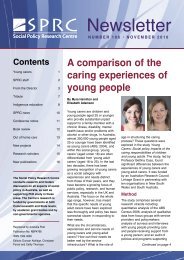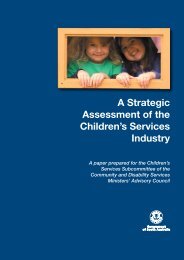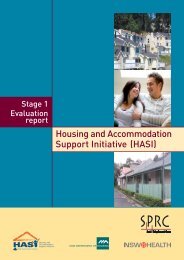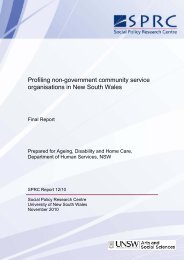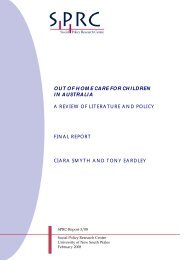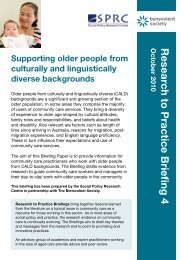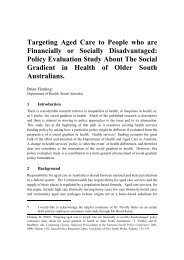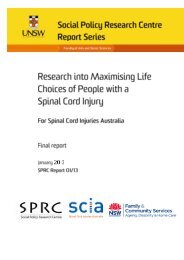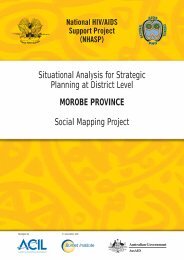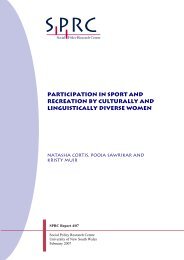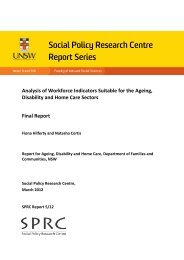Global Study On Child Poverty And Disparities (PDF) - Social Policy ...
Global Study On Child Poverty And Disparities (PDF) - Social Policy ...
Global Study On Child Poverty And Disparities (PDF) - Social Policy ...
You also want an ePaper? Increase the reach of your titles
YUMPU automatically turns print PDFs into web optimized ePapers that Google loves.
The Ministry of Education finalised the Vanuatu<br />
Education Sector Strategy 2007–2016 in<br />
December 2006, and it was endorsed by the<br />
Council of Ministers. The Strategy identifies policy<br />
reforms and investment for the education system<br />
and emphasizes the need for improvement in<br />
quality, efficiency, equity and relevance in order to<br />
sustain long-term goals and meet national needs.<br />
In July 2007 the draft Medium Term Expenditure<br />
Framework for 2008–2010 identified as priorities<br />
improving access, quality, capacity building, policy<br />
development and preparing a national human<br />
resources plan (ADB 2009a, p. 99).<br />
In 2008 the Ministry of Education, with support<br />
from donor partners, developed the Vanuatu<br />
Education Support Action Plan, which includes<br />
the SWAp to improve human and infrastructure<br />
resources. The ADB report indicates that external<br />
finances will be integrated with funds from the<br />
national budget and the program will be fully<br />
managed by the Ministry of Education; however,<br />
this will require “substantial strengthening of<br />
MoE’s administrative capacity” (ADB 2009a, p.<br />
100).<br />
<strong>Social</strong> protection<br />
Vanuatu is still seen as a country where strong<br />
social networks and kinship ties will take care of<br />
those unable to care for themselves. In 2007, the<br />
government allocated 78 million vatu to social<br />
protection, which represented only 0.6 per cent of<br />
total government expenditure.<br />
An important institution, however, is the VNPF,<br />
established in 1986, a compulsory saving scheme<br />
with contributions made by both the employer<br />
and employee that covers all civil servants and<br />
employees in the private sector. That is, it covers<br />
those in formal employment, estimated at about<br />
20 per cent of the working-age population.<br />
Those employed in the formal labour market have<br />
additional avenues of social protection. Changes<br />
in the recent Amendments to the Employment Act<br />
2008 included increased benefits for severance,<br />
maternity and sick pay. Severance pay increased<br />
from two to eight weeks for every year of<br />
employment; the qualifying period for severance<br />
pay was reduced from 10 years to one year;<br />
eligibility for maternity pay was reduced from six<br />
months to three months employment; and annual<br />
and sick leave increased from 12 working days<br />
after one year of employment to 21 days for each<br />
type of leave (ADB 2009c).<br />
National laws, policies and<br />
programmes<br />
The Vanuatu Country Programme Action<br />
Plan 2008–2012, a partnership between the<br />
Government and UNDP, addresses four strategic<br />
outcome areas, one of which is poverty reduction<br />
and the MDGs. The priorities of the Programme<br />
are aligned with two of the Pacific Sub-Regional<br />
United Nations Development Assistance<br />
Framework Outcomes: equitable economic growth<br />
and poverty reduction, and equitable social and<br />
protection services. The Plan addresses these<br />
priorities by localising MDGs and strengthening<br />
planning, statistical and aid management systems.<br />
The UNDP supported the development of the<br />
national monitoring system to collect MDG data as<br />
a basis for developing a national poverty line and<br />
ensuring a second national MDG report which was<br />
updated in 2010.<br />
A further recent social protection development<br />
in Vanuatu is the implementation of the National<br />
Disability <strong>Policy</strong> and Plan of Action, which includes<br />
nine policy directives. Most relevant to children’s<br />
well-being are numbers 6 (poverty alleviation)<br />
and 7 (early detection, early prevention and<br />
education). The National Disability Committee<br />
was formed in 2006 to oversee progress in this<br />
area. In the education sector, there is in principle<br />
agreement that disabled children should not be<br />
excluded from education. However, at this stage<br />
there is little information on disabled children:<br />
where they live, how many of them there are, or<br />
the nature of their disabilities. In some instances,<br />
it would appear that adoption of the principles of<br />
rights (for children, or other disadvantaged groups<br />
such as the mentally ill) progresses far more<br />
quickly than the capacity to implement them.<br />
The Vanuatu Women’s Centre is funded by<br />
AusAID and Fiji’s Women’s Crisis Centre to<br />
help protect women and children from violence.<br />
Funding has been committed for 2007 to 2012.<br />
The Centre also lobbied Parliament on the Family<br />
Protection Bill, and contributed to the survey on<br />
gender-based violence. AusAID and UNIFEM’s<br />
Women in Decision-Making and Leadership<br />
initiative committed $100,000 in 2007 toward<br />
empowering women to participate in public and<br />
community events, and developing leadership<br />
opportunities in Parliament.<br />
There is also a women’s microfinance project.<br />
VANWODS Microfinance is a member-owned<br />
NGO that operates in Efate, Santo and Malekula.<br />
With over 5,000 members, it has become<br />
operationally self-sufficient and is working towards<br />
financial sustainability.<br />
68



